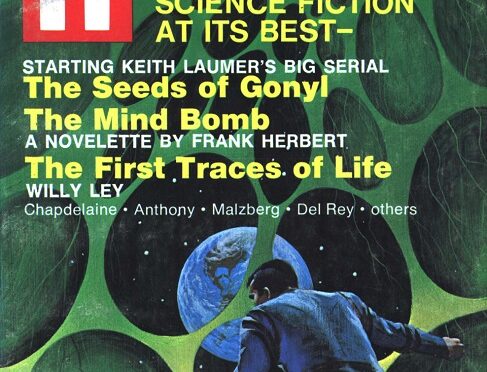
by David Levinson
Silly season
It’s considered a truism in journalism that nothing happens in August, so the papers run filler stories about silly things to make up their page count. Sure, Hurricane Camille killed hundreds as it raged from Mississippi to Virginia, and China and the Soviet Union are on the brink of war, but that doesn’t sell papers. Madison Avenue also has a truism: sex sells. Now, the two have come together.
Newsday columnist Mike McGrady was disgusted by the schlocky, sex-obsessed books that regularly make the best-seller lists, so he recruited a bunch of fellow journalists (19 men and five women, by one count) to write a deliberately bad, oversexed book. The result is Naked Came the Stranger, in which the editors worked hard to remove any literary value from the tale of a New York woman’s sexual escapades.
When the book sold 20,000 copies, McGrady and his co-conspirators decided they’d better come clean. Nineteen of them appeared on The Dick Cavett Show, being introduced as Penelope Ashe (the book’s purported author) and walking out to the strains of A Pretty Girl Is Like a Melody. As a result of their confession and discussion of their motives, the book has become even more popular. And as of last Sunday, it’s on the New York Times list of best-sellers. You have to laugh to keep from crying.
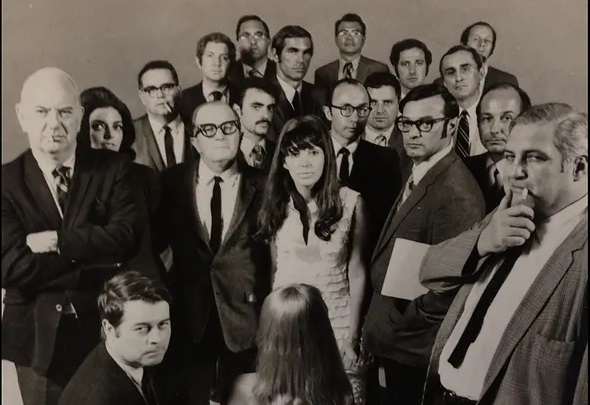 Penelope Ashe, in part, with the cover model superimposed.
Penelope Ashe, in part, with the cover model superimposed.
This puts me in mind of a similar literary hoax with a more sfnal connection. Back in 1956, radio host Jean Shepherd was unhappy with the way best-seller lists were being compiled and urged his listeners to ask their local bookstores to order I, Libertine by Frederick R. Ewing. He offered some vague hints about the plot, and many listeners who were in on the joke created references to the book elsewhere. Demand was so high, publisher Ian Ballantine convinced Theodore Sturgeon to knock out a quick novel based on an outline from Shepherd. Betty Ballantine wrote the last chapter as Sturgeon lay in exhausted sleep on the Ballantines’ couch after trying to write the whole thing in one sitting. The cover by Frank Kelly Freas is full of visual jokes and puns. The book is rumored to have gone to number one, but it doesn’t seem to have been on any lists, probably out of pique on the part of the list makers.
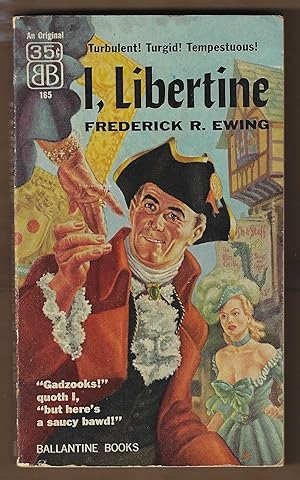
The pub sign features a shepherd’s crook and a sturgeon. Art by Frank Kelly Freas
New and old
I think we’re starting to see some of the influence of new editor Ejler Jakobsson. Editor Emeritus Fred Pohl doesn’t seem have ever had anything nice to say about the New Wave, while there is at least one story in this month’s IF with a nod in that direction. There’s a new printer, with a crisper typeface (though it seems better suited to a news magazine than fiction). No one’s mixed up their e’s and o’s, but instead of lines being printed out of order, some lines are just missing. Hopefully, that will be corrected in future issues.
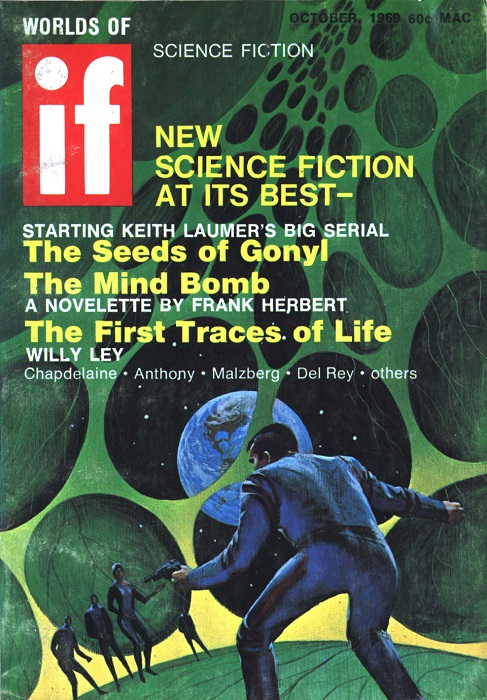 Supposedly for Seeds of Gonyl. If so, it’s from later in the novel. Art by Gaughan
Supposedly for Seeds of Gonyl. If so, it’s from later in the novel. Art by Gaughan
The Mind Bomb, by Frank Herbert
Frank Herbert appears to have tried to write a Philip K. Dick story. There’s a computer that keeps changing the world in an attempt to carry out its function, an unhappy marriage, and an old man who gets a glimpse of why the world he lives in is the way it is.
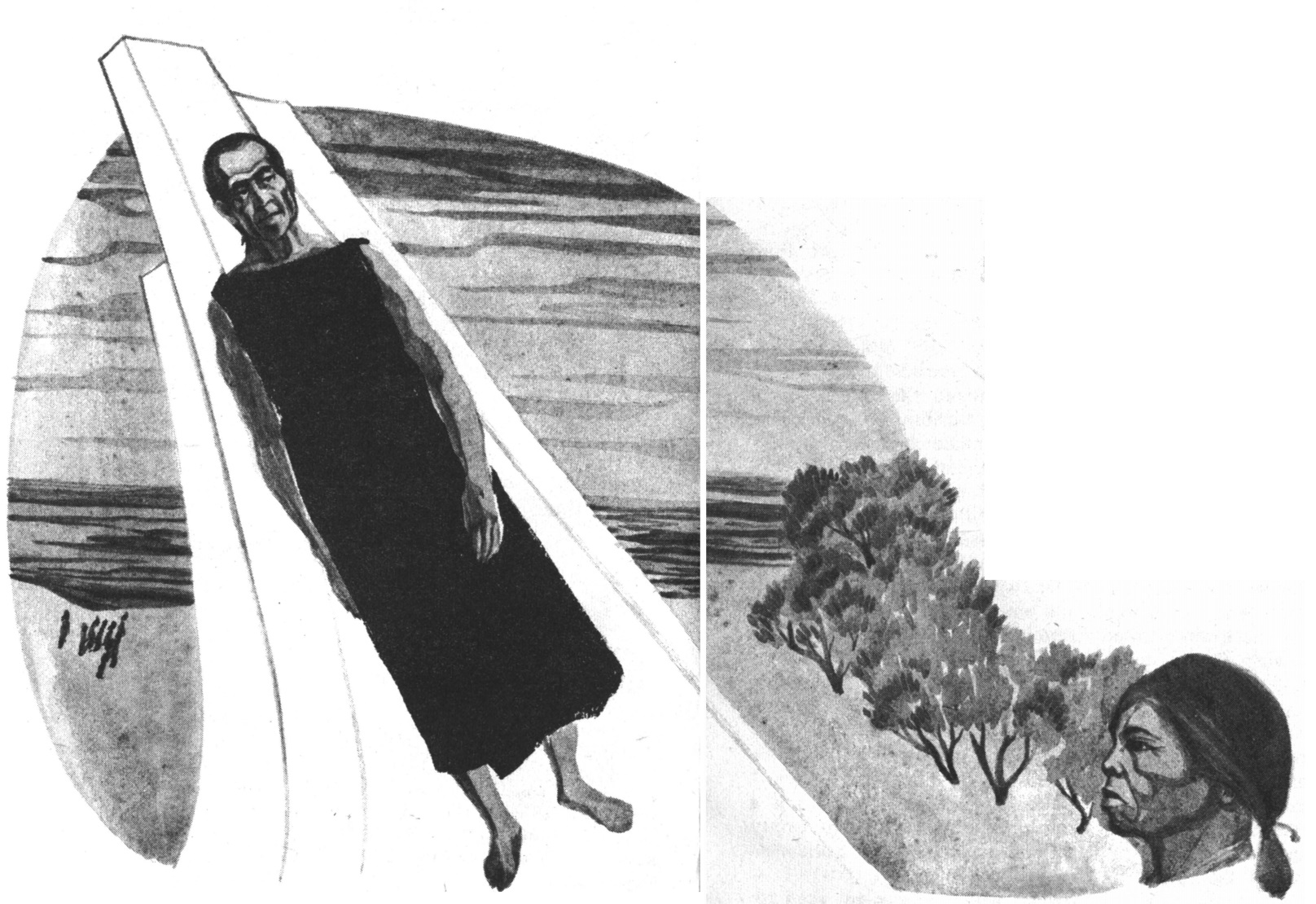 Art uncredited, maybe by Gaughan
Art uncredited, maybe by Gaughan
Unfortunately, none of it works. The lines of reality aren’t blurred; people know the computer is changing things, just not why. And the marriage isn’t as unrelievedly grim as in a Dick story (thank goodness). We’re left with none of the good things that either author brings, and the flaws of both.
Two stars.
By Right of Succession, by Barry Malzberg
A man named Carson shoots the occupant of a motorcade. As he leaves the building he fired from, he’s met by a policeman who escorts him to his next destination on a strict timetable. Eventually, all is explained. Sort of.
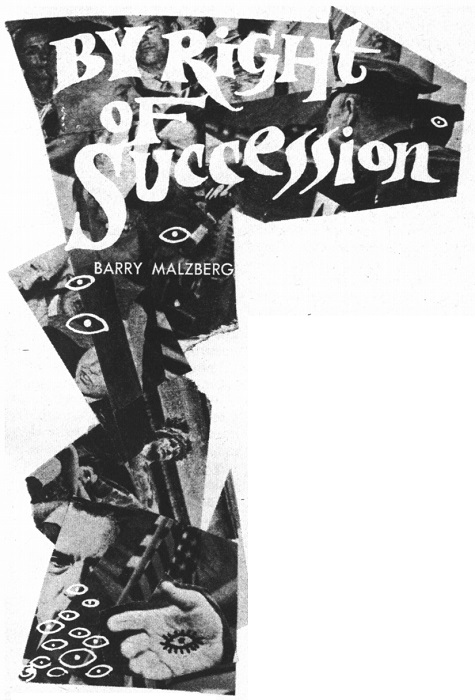 Is that Nixon? Art uncredited
Is that Nixon? Art uncredited
Here’s our New Wave—or New Wave-ish—story. It’s fine for what it is, but I don’t quite see the connection between the events and the explanation.
Three stars.
None But I, by Piers Anthony
When last we saw him, interstellar dentist Dr. Dillingham had been accepted as an instructor at the galaxy’s top dental school. Now he’s off to cure the oral ills of a long-buried robot that has vowed to kill the person that frees it from 10,000 years of imprisonment.
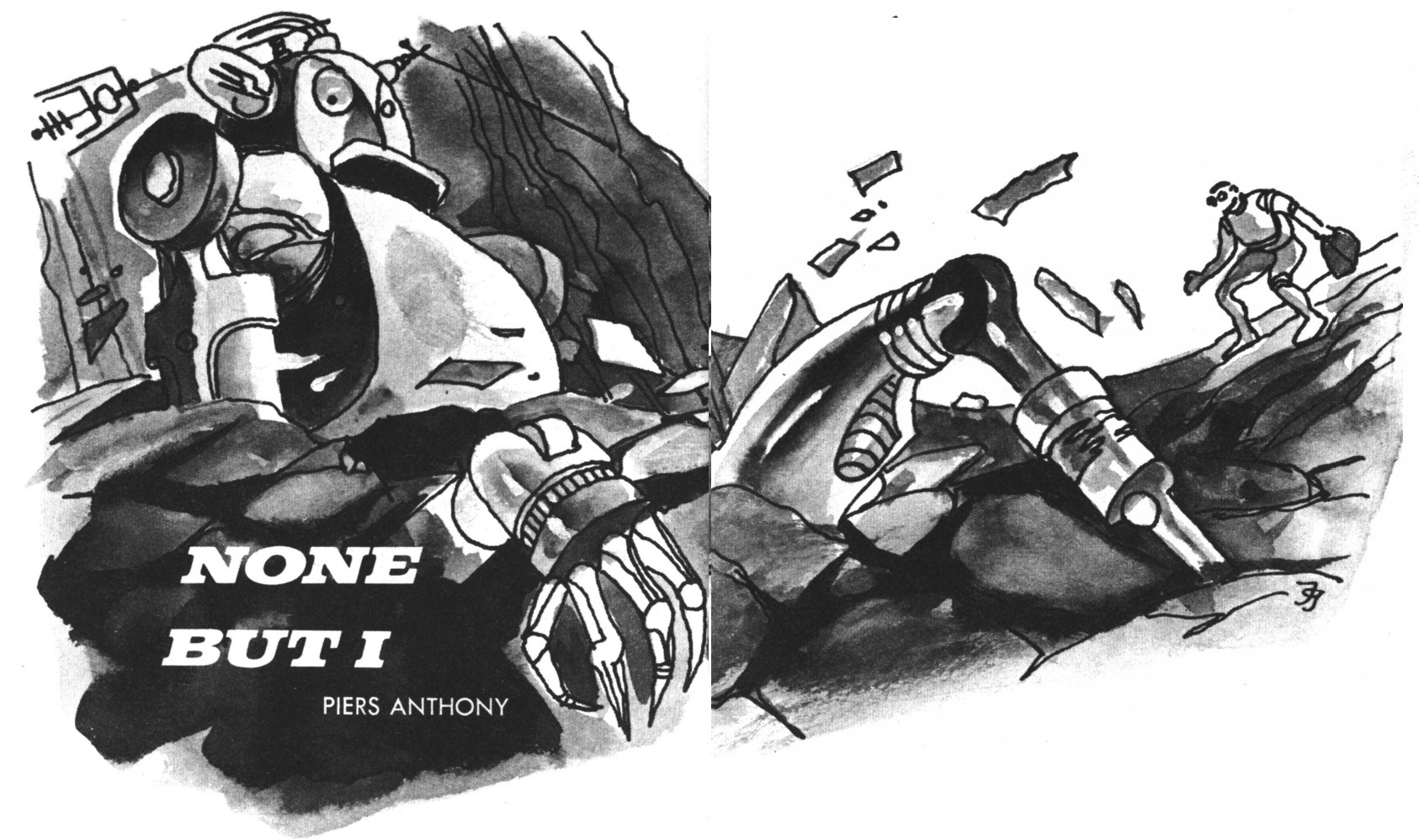 Dr. Dillingham meets his patient. Art by Gaughan
Dr. Dillingham meets his patient. Art by Gaughan
Anthony is developing a reputation at the Journey, and not a good one. That’s largely down to the way he writes women. Fortunately, none of that is on display here, possibly because the only female character is a highly efficient secretary who looks like a giant spider. We’re left with an inoffensive and mildly entertaining story, whose only flaw is that it specifically makes note of the old tale it is clearly modeled on of a genie with a similar vow.
Three stars.
Survival, by Steven Guy Oliver
A day in the life of an old man living in the irradiated ruins of a city.
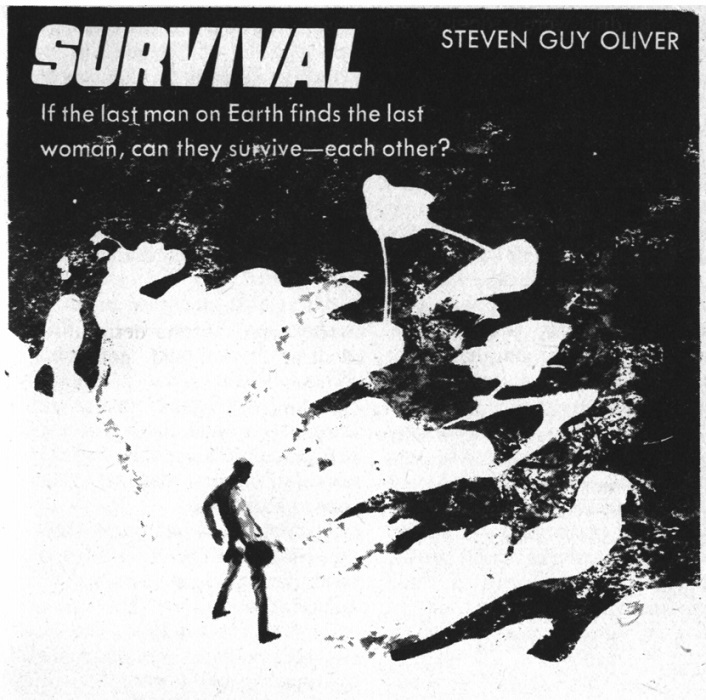 Ignore the blurb. These aren’t the last people on Earth. Art by Gaughan
Ignore the blurb. These aren’t the last people on Earth. Art by Gaughan
This month’s new author offers us a grim tale of life after World War Three. It’s very well written, but also very depressing, what I believe kids these days call “a real downer.” I definitely wouldn’t mind seeing more from Oliver. But did I mention that the story is grim?
Three grim stars.
Down on the Farm, by W. Macfarlane
Three agricultural salespeople were brought from Earth to a distant planet. Now their contract is up, and the local autocrat who hired them struggles to find a way to pay what they’re due. Unbeknownst to him, they have ulterior motives.
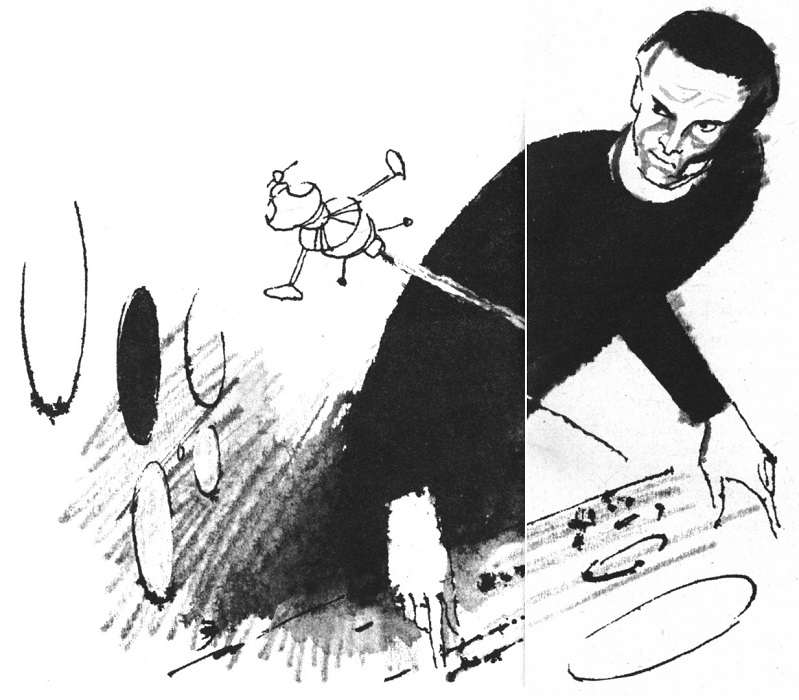 Erasmus Ballod is having a bad day. Art by Gaughan
Erasmus Ballod is having a bad day. Art by Gaughan
A bit old-fashioned, but otherwise an enjoyable enough story. Ask me what it was about a month from now, and I won’t be able to tell you, but it didn’t waste my time. For some reason, Macfarlane’s name was left off the first page; fortunately he was credited in the table of contents.
Three stars.
The Story of Our Earth: 2. The First Traces of Life, by Will Ley
The second part of Willy Ley’s sadly incomplete final book looks at the latest theories as to how life began. He discusses the idea of the “primordial ooze” and how and why it has fallen out of favor. The chapter concludes with a brief discussion of continental drift.
While still very good, this chapter didn’t engage me quite as much as the previous did. I can’t say if that’s down to my interest in the subject matter or the quality of Ley’s treatment of it.
A very high three stars.
The Seeds of Gonyl (Part 1 of 3), by Keith Laumer
Jeff Mallory wakes up to discover that three months are missing, the house shows little sign of cleaning and maintenance, and his wife and two younger children are frightened and worn down. Worst of all, no one remembers his oldest daughter, and her room doesn’t even exist. He soon learns that the town has been taken over by things that are barely human, which force everyone to work on a mysterious project.
Remembering that his daughter was planning to stay with a friend who lives well outside of town, Jeff makes his escape. At the friend’s house, he finds only the friend and several unpleasant occupiers, who tell him that the United States has fallen to Russian forces and that his town is a bombed-out, plague-ridden ruin.
He and Sally, his daughter’s friend, move on and are arrested by Russian military. But the Russians are working together with Americans led by a Colonel Strang, who tells him that the Russians were called in to fight the real occupiers, the Chinese. As the installment ends, Jeff finds himself drafted into Strang’s army. To be continued.
 Tonight, the role of Colonel Strang will be played by Ronald Reagan. Art by Gaughan
Tonight, the role of Colonel Strang will be played by Ronald Reagan. Art by Gaughan
So far, so Laumer. He may be influenced by some of his work on those books he wrote based on The Invaders, what with people not believing in the invading aliens. Honestly, the main thing that stands out to me in this part is the way young Sally abruptly and quickly throws herself at our hero. Jeff put up at least a token resistance so far, though there is a vague paragraph that suggests things could be otherwise. It plays uncomfortably.
Three stars so far, if you like this sort of Laumer story.
To the Last Rite!, by Perry Chapdelaine
One-Girk-Two is undergoing a field test to see if he will be promoted to One-Girk-One. If he passes, he will become the thinking portion of a composite creature called a Unit.
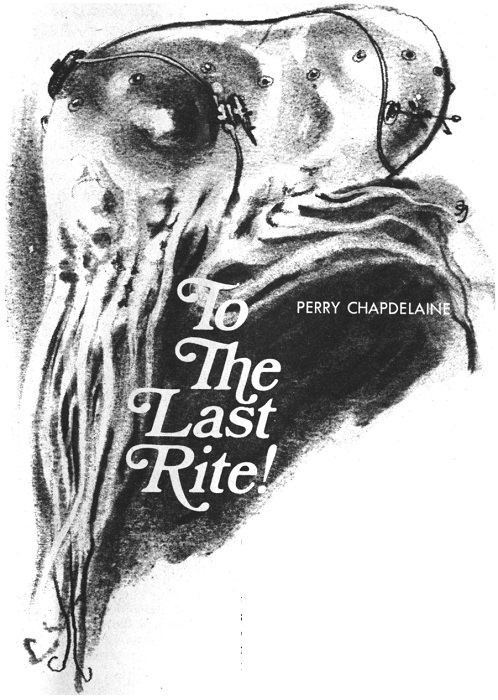 Our hero. Art by Gaughan
Our hero. Art by Gaughan
This is probably the Chapdelaine story I’ve enjoyed the most. Unfortunately, like all of Chapdelaine’s work, it’s too long. On the other hand, it didn’t go where I thought it was going. Best of all, it has nothing to do with Spork.
Three stars.
Machines That Teach, by Frederik Pohl
Fred took a trip to Tennessee A. & I. In Nashville, where Perry Chapdelaine is a professor of mathematics and is running a lab researching computer aided instruction. There, through a computer in the lab, a computer at Stanford in California administered a test to measure competence in mathematics. Neat stuff, even if the headline is misleading. Maybe even more interesting is the simple fact that he was able to use a computer in Tennessee to interact with another computer a couple thousand miles away
Three stars.
Summing up
We’re starting to see some of the new editor’s influence, though things aren’t really that different. I’m wondering if Jakobsson is going to continue the IF first program, running a story from a new author every month. The issues he’s been in charge of have had such a story, but he hasn’t called attention to it the way Fred did.
The other thing that stands out to me is that the interior art is all uncredited. Where I’ve indicated it’s by Gaughan, it’s because his signature is visible either on the piece reproduced here or a different piece for the same story. I’m not too keen on all the art coming from just one artist (although if the alternative is “art” by Dan Adkins…). More importantly, they give out Hugos for art. If we don’t know who did it, how do we know who to nominate and vote for?
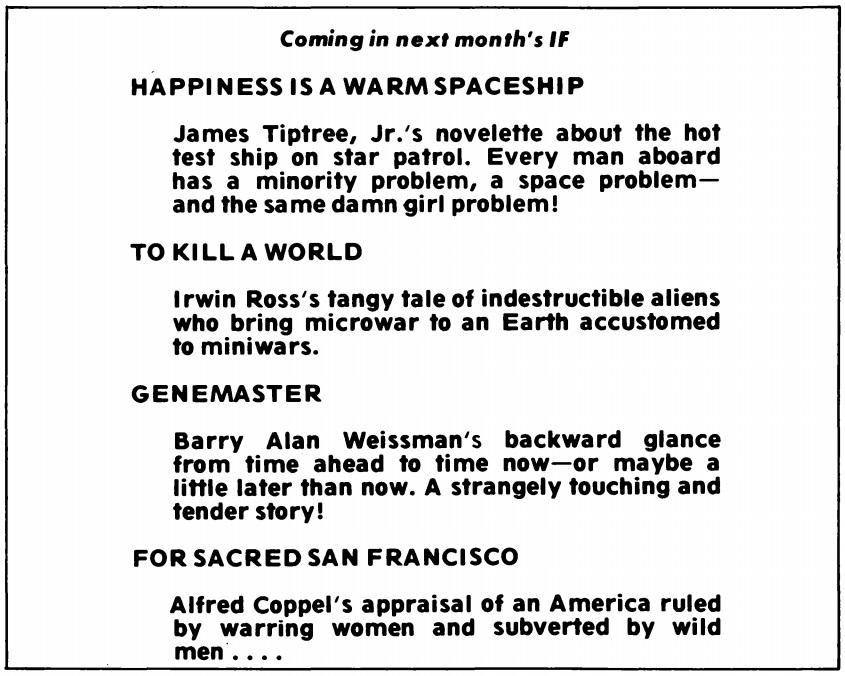 Tiptree is the only name that means anything to me. A bit of a coin flip as an author, but definitely improving with every story.
Tiptree is the only name that means anything to me. A bit of a coin flip as an author, but definitely improving with every story.

